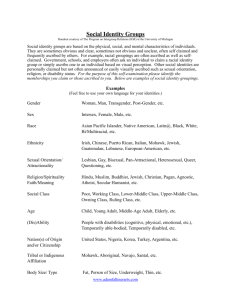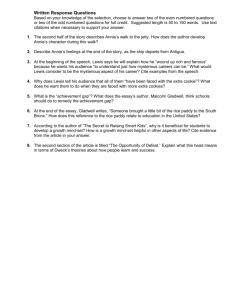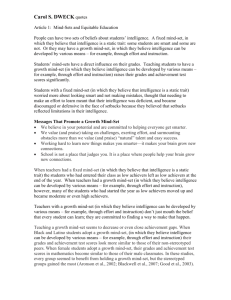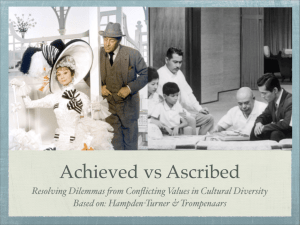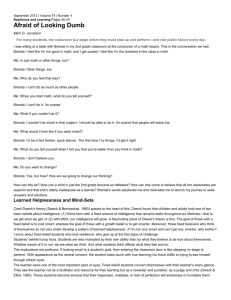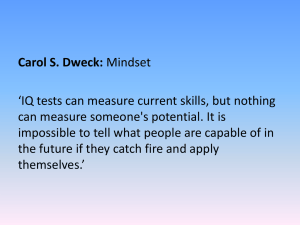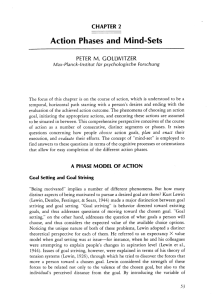The Effect of Ascription versus Achievement MindSset in Consumer
advertisement
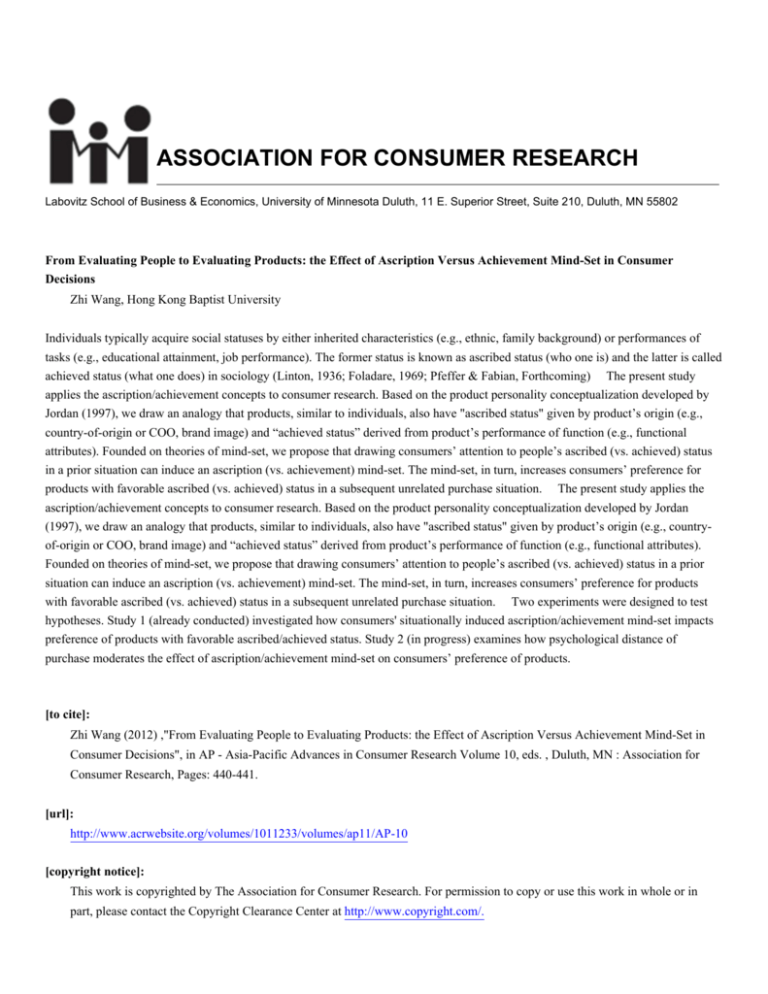
ASSOCIATION FOR CONSUMER RESEARCH Labovitz School of Business & Economics, University of Minnesota Duluth, 11 E. Superior Street, Suite 210, Duluth, MN 55802 From Evaluating People to Evaluating Products: the Effect of Ascription Versus Achievement Mind-Set in Consumer Decisions Zhi Wang, Hong Kong Baptist University Individuals typically acquire social statuses by either inherited characteristics (e.g., ethnic, family background) or performances of tasks (e.g., educational attainment, job performance). The former status is known as ascribed status (who one is) and the latter is called achieved status (what one does) in sociology (Linton, 1936; Foladare, 1969; Pfeffer & Fabian, Forthcoming) The present study applies the ascription/achievement concepts to consumer research. Based on the product personality conceptualization developed by Jordan (1997), we draw an analogy that products, similar to individuals, also have "ascribed status" given by product’s origin (e.g., country-of-origin or COO, brand image) and “achieved status” derived from product’s performance of function (e.g., functional attributes). Founded on theories of mind-set, we propose that drawing consumers’ attention to people’s ascribed (vs. achieved) status in a prior situation can induce an ascription (vs. achievement) mind-set. The mind-set, in turn, increases consumers’ preference for products with favorable ascribed (vs. achieved) status in a subsequent unrelated purchase situation. The present study applies the ascription/achievement concepts to consumer research. Based on the product personality conceptualization developed by Jordan (1997), we draw an analogy that products, similar to individuals, also have "ascribed status" given by product’s origin (e.g., countryof-origin or COO, brand image) and “achieved status” derived from product’s performance of function (e.g., functional attributes). Founded on theories of mind-set, we propose that drawing consumers’ attention to people’s ascribed (vs. achieved) status in a prior situation can induce an ascription (vs. achievement) mind-set. The mind-set, in turn, increases consumers’ preference for products with favorable ascribed (vs. achieved) status in a subsequent unrelated purchase situation. Two experiments were designed to test hypotheses. Study 1 (already conducted) investigated how consumers' situationally induced ascription/achievement mind-set impacts preference of products with favorable ascribed/achieved status. Study 2 (in progress) examines how psychological distance of purchase moderates the effect of ascription/achievement mind-set on consumers’ preference of products. [to cite]: Zhi Wang (2012) ,"From Evaluating People to Evaluating Products: the Effect of Ascription Versus Achievement Mind-Set in Consumer Decisions", in AP - Asia-Pacific Advances in Consumer Research Volume 10, eds. , Duluth, MN : Association for Consumer Research, Pages: 440-441. [url]: http://www.acrwebsite.org/volumes/1011233/volumes/ap11/AP-10 [copyright notice]: This work is copyrighted by The Association for Consumer Research. For permission to copy or use this work in whole or in part, please contact the Copyright Clearance Center at http://www.copyright.com/. | Zhi Wang, Hong Kong Baptist University INTRODUCTION Individuals typically acquire social statuses by either inherited characteristics (e.g., ethnic, family background) or performances of tasks (e.g., status is known as ascribed status (who one is) and the latter is called achieved status (what one does) in sociology (Linton, 1936; Foladare, 1969; Pfeffer & Fabian, Forthcoming) The present study applies the ascription/ achievement concepts to consumer research. Based on the product personality conceptualization developed by Jordan (1997), we draw an analogy that products, similar to individuals, also have “ascribed status” given by product’s origin (e.g., country-oforigin or COO, brand image) and “achieved status” derived from product’s performance of function (e.g., functional attributes). Founded on theories of mindset, we propose that drawing consumers’ attention to people’s ascribed (vs. achieved) status in a prior situation can induce an ascription (vs. achievement) mind-set. The mind-set, in turn, increases consumers’ preference for products with favorable ascribed (vs. achieved) status in a subsequent unrelated purchase situation. THEORETICAL FRAMEWORK A mind-set concerns the effect of performing a cognitive or motor behavior in one situation (e.g., focusing on a person’s ascribed status when evaluating a person) on the likelihood of performing a conceptually similar behavior in subsequent, unrelated situations (e.g., focusing on a product’s ascribed status when evaluating a product, Xu, cognitive procedures. The underlying mechanism of a mind-set can be conceptualized using knowledge accessibility (Higgins, 1996; Bargh, 2002). concepts, cognitive procedures) is stored in memory and varies in terms of accessibility. When processing new information, some of this knowledge is activated and used. The likelihood that a unit of knowledge is activated is a function of the recency with which it has been activated and applied before. The effect of mind-set can be seen as one manifestation of this type of persistence. Moreover, this persistency effect can occur for reasons of which individuals are unaware. Ascription mind-set consumers, compared to achievement mind-set consumers, are more likely to prefer products with favorable ascribed status. : Achievement mind-set consumers, compared to ascription mind-set consumers, are more likely to prefer products with favorable achieved status. METHODOLOGY Two experiments were designed to test hypotheses. Study 1 (already conducted) investigated how consumers’ situationally induced ascription/ achievement mind-set impacts preference of products with favorable ascribed/achieved status. Study 2 (in progress) examines how psychological distance of purchase moderates the effect of ascription/ achievement mind-set on consumers’ preference of products. Study 1 had a 3 (Mind-set Type: Ascription vs. Achievement vs. No) x 2 (Laptop Product Version: functional attributes second vs. functional attributes undergraduate students participated in the study. The last factor was included to rule out any possible primacy and/or recency effects of information on product evaluations, the dependent variable. Mindset was manipulated by exposing participants to anecdotes of celebrities bearing either ascribed status (derived from family background) or achieved status (given by personal efforts and performances). Product A had positive value on COO but negative value on functional attributes (e.g., CPU). For B, the values were the opposite. So which product would be preferred by participants should depend on which kind of product status (ascribed or achieved) was perceived as more salient. All product stimuli information was way repeated measure. As no reliable effects of Information Order were observed (p > .10) and the patterns of results were the same w/o this factor, it was dropped from further analysis. Results of a twoway repeated measure then revealed a main effect of the product version (F(1, 72) = 4.32, p < .05), showing that laptop A was evaluated more positively (M = 4.32) than laptop B (M = 4.52). However, consistent distance of purchase) that can moderate the effect. Last, it contributes to product personality literature by providing a new perspective to classify product status (ascribed vs. achieved). To the author’s knowledge, F(2, 72) = 15.61, p < .01) of Mind-set Type and Product Version. REFERENCES Bargh, John A. (2002), “Losing Consciousness: of laptop A (M = 5.28) than laptop B (M = 4.07, F(1, 72) = 26.39, p < .01); in the Achievement Mind-set evaluation of laptop B (M = 4.47) than laptop A (M = 3.91, F(1, 72) = 6.82, p < .05); in the control condition, however, participants’ evaluations of the two versions M_ A = 4.51, M_ B = 4.37,F(1, 72) = 0.42, p > .50). Further simple effects tests showed that the effects of Product Version depended on different conditions of Mind-set Type, all three p’s < .05. Study 2 further explores the boundary condition of the effect. Consistent with literature (e.g., Han, 1989; Maheswaran, 1994), we argue that statuses (e.g., those based on various functional attributes) of products, ascribed statuses (those based on COO and brand image, etc.) are more abstract, general and global. According to Construal level theory (Psychological distance Construal level Prediction, evaluation and behavior, Trope & Liberman, 2010), Ascription Mind-set should exert an effect only for psychological distant purchases while Achievement Mind-set should affect evaluation only for psychological near purchases. This hypothesis will be tested in Study 2, which has a 3 (Mind-set Type) x 2 (Product Version) x 2 (Psychological distance: psychological distance will be manipulated along the temporal distance dimension because of its wide use in research concerning Construal Level Theory. DISCUSSION This research contributes to literature in three ways. First, while most previous research focuses on conscious information processing in product evaluation, we provides evidence that unconscious processes (mind-set) may also play a role. Second, concept has ever been introduced to consumer behavior research. Behavior, and Motivation,” Journal of Consumer Research, 29 (2), 280-85. Han, C. Min (1989), “Country Image: Halo or Summary Construct?” Journal of Marketing Research, 26 (May), 222-29. Higgins, E. Tory (1996), “Knowledge Activation: Accessibility, Applicability and Salience,” in Social Psychology: Handbook of Basic Principles, ed. E. Tory Higgins and Arie W. Kruglanski, New York, NY: Guilford, 133-68. Jordan, Patrick W. (1997), “Products as Personalities,” in Contemporary Ergonomics, ed. M A. Hanson, London, UK: Taylor & Francis, 73-8. Linton, Ralph (1936), “Status and Role,” in The Study of Man, New York, NY: D. AppletonCentury. as Stereotypes: The Effects of Consumer Expertise and Attribute Information on Product Evaluations,” Journal of Consumer Research, 21 (2), 354-65. Pfeffer, Fabian T. (2011), “Status Attainment and Wealth: Revisiting the Achievementascription Debate,” in The Comparative Study of Intergenerational Mobility, ed. Robert Erikson, York, NY: Russell Sage Foundation. Trope, Yaacov and Nira Liberman (2010), “Construal-Level Theory of Psychological Distance,” Psychological Review, 117 (2), 44063. Xu, Alison Jing and Robert S. Wyer Jr. (2007), “The Effect of Mind-sets on Consumer Decision Strategies,” Journal of Consumer Research, 34 (4), 556-66.
